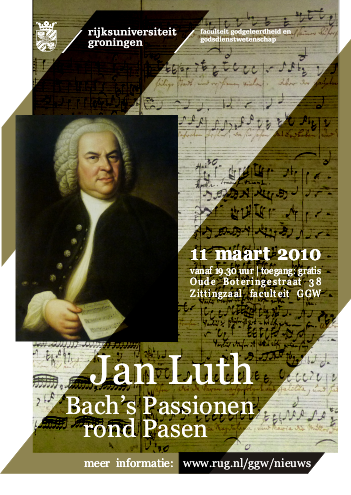Dr Jan R. Luth: ‘The St Matthew Passion is so good that even mediocre performances of it are impressive’

The average listener hardly understands what it is really about. Nevertheless, Dutch audiences flock to performances of the St Matthew Passion each year on Good Friday, which makes perfect sense, according to Bach expert and University of Groningen theologian Dr Jan Bakker. ‘It is such an indescribably good piece of music – you constantly discover new aspects to it. Even a mediocre performance will leave a great impression.’ Luth will be giving a public lecture on the famous Bach piece on 11 March 2010.
It is only early March, but St Matthew Passion fever is already cropping up throughout the Netherlands. In the build-up to the explosion of performances on Good Friday, lectures are being given all over the country on the famous composition by J.S. Bach. No other country in the world sees so many performances of the St Matthew Passion on Good Friday. Luth: ‘Even in Germany, where Bach was born, the piece is only performed in a few places. Germans are extremely surprised by this strange Dutch phenomenon.’
Polder passion
Conductor Willem Mengelberg of the Concertgebouworkest in Amsterdam began the Dutch Matthew tradition in 1899 by performing the piece every year. By now, the annual performances have become a craze in the Netherlands. There are all sorts of phenomena resulting from this, from people bringing along their own score to ‘polder passions’ (translated performances) and even sing-alongs. What is this obsession based on? According to Jan Luth, it is the unparalleled quality of the piece. ‘The individuality of the themes and patterns is amazing. If you take a random piece of music by Mozart or Beethoven, and cover up part of the score, most musicians will be able to predict what that bit will be like. They will not be able to with Bach, however. His creativity was boundless. You do not need to know much about music to be very impressed by that.’
The broad outline
The dramatic content of the story – the passion of Jesus Christ – is also something that many listeners intuitively react to, says Luth. Though most listeners will be able to follow the broad outline of the story, Luth feels that the average listener will not have a thorough understanding of its more complex aspects. ‘It takes a lot of study to understand what the St Matthew Passion is really about. Even eminent theologian Karl Barth basically had no idea. Bach and his contemporaries were experienced interpreters of Old Testament texts, such as the Song of Songs, which is closely tied to the St Matthew Passion. Now, three centuries later, we approach it from such a completely different context that even very basic concepts are lost on us.’
Religion for atheists
Jan Luth considers the popularity of the piece to be completely separate from its deeply religious connotations. ‘Even staunch atheists such as Alexander Pechtold and the late Martin van Amerongen adored the piece. Van Amerongen wrote that the first time he attended a performance of the piece was like a religious experience for him.’ But its impressive power lies in the genius of the music rather than in its religious content, according to Luth. ‘In the years during which this tradition emerged, the Netherlands was still a deeply religious country. Since then, the Dutch have become less and less religious, while the Passion’s popularity has only increased.’
Curriculum Vitae
Dr Jan R. Luth teaches Liturgical Studies at the University of Groningen, specializing in Hymnology. He studied theology in Kampen, musicology in Utrecht and the organ in Hilversum and Amsterdam. He considered a top expert on Bach. In addition to his academic work he is active as a concert organist and gives many public lectures on Bach. He has released a CD with compositions by Johann Sebastian Bach and Johann Ludwig Krebs.
You can find out more about Jan Luth’s public lecture here.
More information: Dr Jan Luth
More news
-
06 January 2026
Connecting with history
